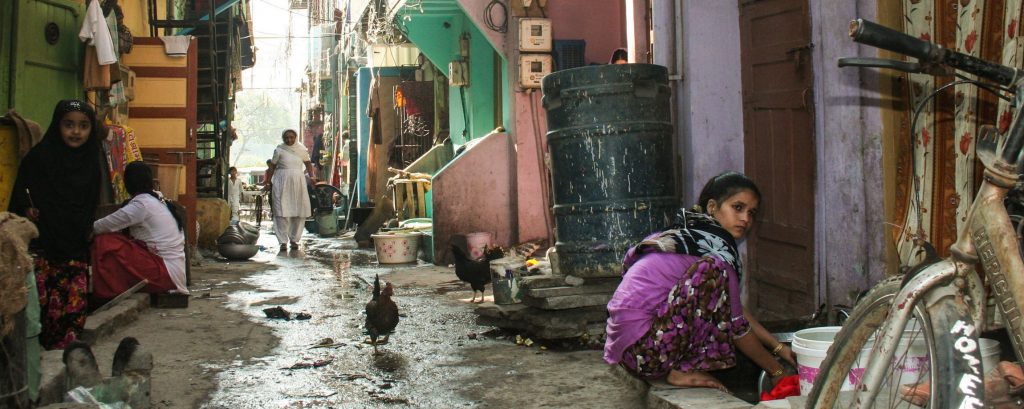Blessed by the Plague is a thought-provoking documentary, shot on digital video, that puts on record the astounding change in Surat from being the filthiest city in India to now being its cleanest city. Produced by Setu Films, a Film and Television Production Company based in Mumbai and known for their high quality work in fiction, non-fiction, theatre and live performance art, the film looks at Surat’s successful efforts to convert itself into a clean and livable place following the plague scare of 1994.
The film emerged through the filmmakers’ (Director Arunabh Bhattacherjee and partner and co-producer Sunil Shanbag) interaction with Dr Lodewijk Brunt, an urban sociologist from the University of Amsterdam and a co-producer of the film. Dr Brunt studies cities particularly cities in crisis for e.g. the role of epidemics in shaping cities. He visited Surat soon after the plague scare and wrote about it extensively in Europe. Subsequently as the makers and Dr Brunt followed the post-plague developments in Surat, they realized there was a film in this remarkable transformation.
The title of the film is ironic because it took the plague scare and the international ostracism that India faced to make Surat what it is today. In that sense, yes, Surat was truly blessed by the plague!
The film is basically split into four parts – pre-plague Surat, the plague and its aftermaths, Surat during commissioner Rao’s tenure and Surat after Rao was transferred and replaced by a new commissioner. Thus the film looks at apathy, its horrific consequences, the initiation of change and most importantly the sustaining of this change. The film looks at the four reasons that caused the plague – the huge immigrant influx into Surat, the inability of the city’s infrastructure to bear this huge human load, total apathy and disinterest of the bureaucracy and the flooding of the city by the River Tapi leaving behind death and disease. The film shows the horrific aftermath of the flood – dead animals, industrial sledge, people dead because of all the filth in the water and then the mysterious disease that killed more than 50 people. Through Rao’s cleanliness drive wherein he inspired the authorities, took citizens into confidence and began changing the face of Surat, the film brings out clearly how transparency in bureaucracy plays a prominent role in removing the rot in a system. It demonstrates how an individual and a system can work together and do wonders. Fortunately the changes initiated by Rao have not fallen by the wayside as his good work is continued by his successor. The success story of Surat is perfectly summed up in an interview with a rag picker who says that they have lost business. No one throws garbage on the streets of Surat anymore! Today 98% of the garbage in Surat is cleared, much higher than other Indian cities, which average a woeful 40%.
In spite of its serious matter, this positive little film is engrossing and its subject matter brought across in a simple yet interesting manner. Little touches of humour aside, here is a film that raises several pertinent questions that you sit up and think. And think deep. Do we need disasters of such magnitude for our eyes to open? Must we wait for messiahs like Rao to bring changes in our cities? While the Bombay Muncipal Corporation feted Rao two years ago for his work in Surat, it would do well if they learnt something from him. Mumbai with its mushrooming slums and an infrastructure that could collapse anytime could well be the next Surat.
The film is put together with the help of archival footage from the local channel, Channel Surat. The channel was born when a local, Nikhil Madrasi, took video footage of Surat during the plague. Realizing the potential of the subject, he subsequently started Channel Surat. When Rao began demolishing of illegal structures, Channel Surat kept people abreast of the happenings with its 15-minute news capsules. Today, Channel Surat is an integral part of Surat’s life – its watchdog so to say!
Unfortunately, there is no proper network in India to screen documentaries such as this. Thus the screenings are usually held for private groups or institutions and in the festival circuit both in India and abroad. Which is a pity since films like this need to be seen and learnt from. Blessed by the Plague was screened at the Mumbai International Short Film and Documentary Film Festival in the International Competition section and has had several private screenings in Mumbai, Pune, Madurai and Trivandrum, Ernakulam and Calicut in Kerala to overwhelming response. The film is also to be shown on the Netherlands Television Network and is up for selection at prominent International Documentary Film Festivals.
Blessed by the Plague once again reiterates Setu Films commitment to high quality documentaries. Their earlier work includes films like Maihaar Raag (1993), a film on the legacy of Baba Allaudin Khan exploring themes such as guru-shisya parampara, patronage, sacred space, and the commitment to the legacy of the founder of a gharana (Maihaar Raag won the National Award for The Best Non-Feature Film of 1993), Dandyat Ram Nahin… (There’s no Joy left…) (1995) – A moving account of the Kolis, Bombay’s fisherfolk, original inhabitants of the island, and their precarious existence on the edge of an ever-growing urban sprawl and an enlightening TV series on parenting, Chhoti Chhoti Baaten (1998-99) which was aired on Zee TV.
Gujarati, English, Documentary, Color



Hey there,
Does anyone happen to have any contacts or information regarding Setu Films? I’m particularly interested in obtaining a copy of this documentary or any related materials for my research.
Any leads or assistance would be greatly appreciated!
Thanks in advance!
Hi, this was a great read.
Any chance you’re in touch with the makers of this documentary? Or any idea where I could find this documentary online?